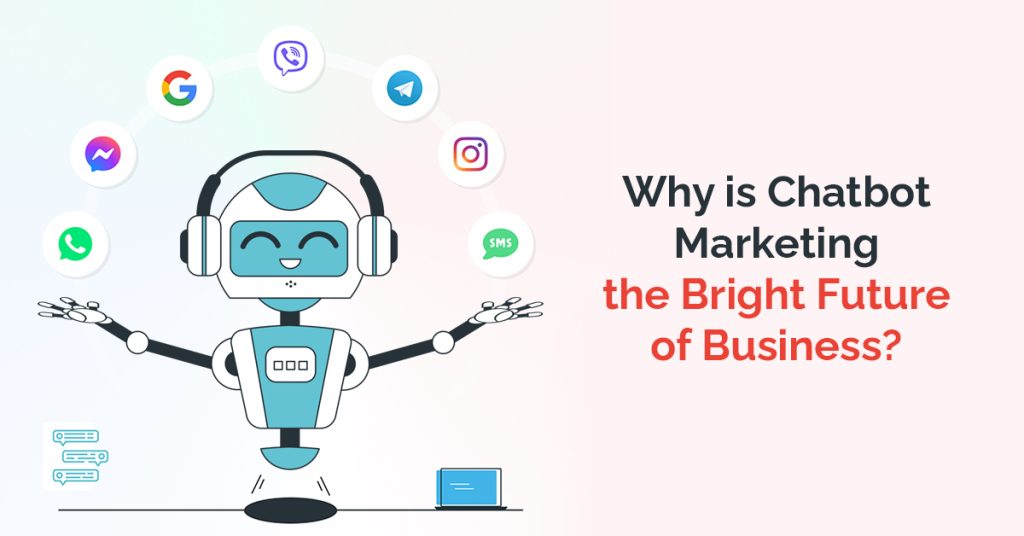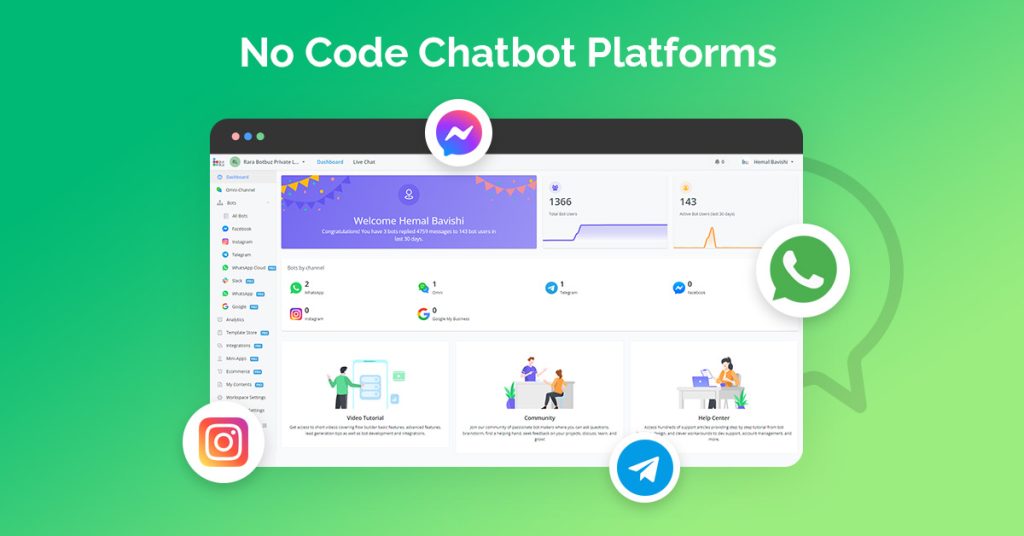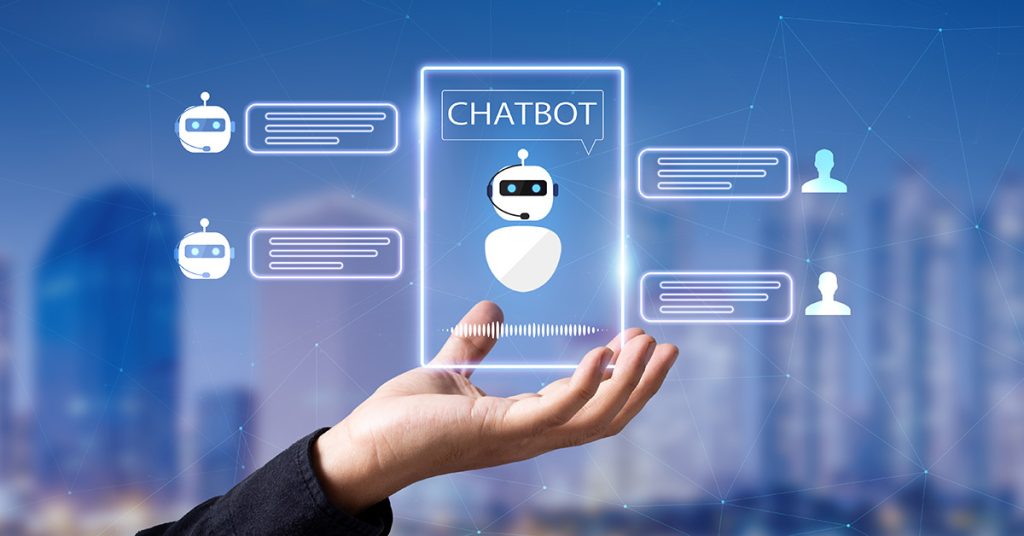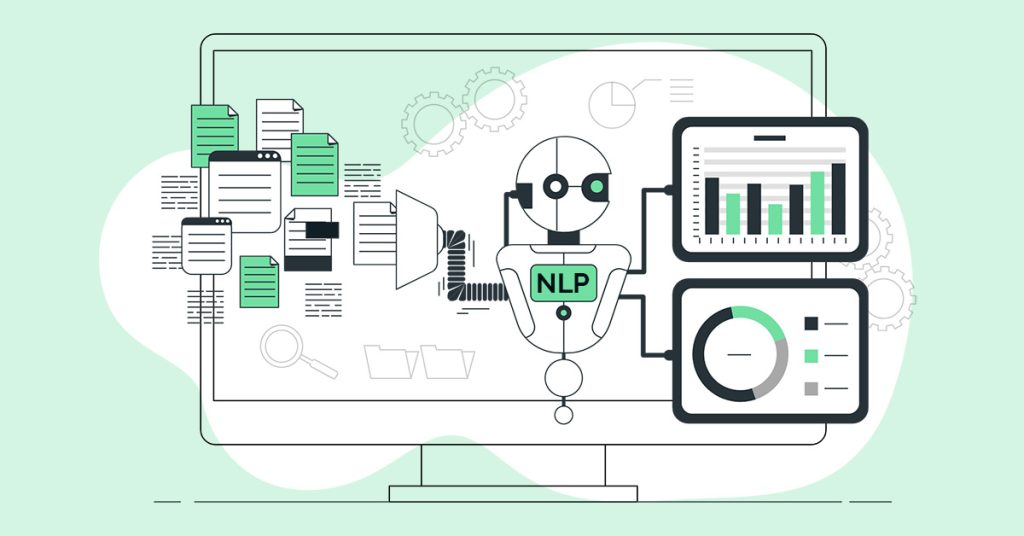- The Rise Of Chatbot Marketing:
- The Evolution of AI in Chatbot Marketing:
- Understanding Chatbot Makreting:
- How Chatbots Enhance Customer Engagement:
- Chatbot Marketing Strategies:
- Implementing Chatbot Marketing:
- Overcoming Challenges:
- Future Trends in Chatbot Marketing:
- Chatbot Marketing Through Botbuz Chatbot:
- Conclusion:
The Rise of Chatbot Marketing:
Chatbot marketing is the use of chatbots to automate marketing tasks. It automates tasks such as lead generation, customer service & sales. Chatbots can interact with customers 24/7. It also provides personalized recommendations, and collects data about customer behavior.
The rise of chatbot marketing is being driven by several factors, including:
The increasing popularity of messaging apps: Messaging apps are now the preferred communication channel for many people. It is especially preferred by younger generations. This makes chatbots a natural fit for marketing. They can be used to reach customers where they are already spending their time.
The growing capabilities of chatbots: Chatbots are becoming sophisticated. It has the ability to understand natural language and respond to complex queries. This makes them more effective at interacting with customers. It helps in providing the information they need.
The falling cost of chatbot development: The cost of developing chatbots has fallen significantly in recent years. Thus, making them more accessible to businesses of all sizes.
The Evolution of AI in Chatbot Marketing:
The evolution of AI in marketing is also playing a role in the growth of chatbot marketing. AI can be used to power chatbots with natural language processing (NLP) capabilities. It allows them to understand and respond to customer queries in a natural way. AI can also train chatbots on large datasets of customer data, so that they can learn to provide personalized recommendations and offers.
As AI continues to evolve, chatbot marketing is likely to become even more widespread. Chatbots will be able to handle more complex tasks. It can help in providing product recommendations, upselling & cross-selling & even closing sales. They will also be able to learn & adapt to customer behavior in real time. Thus, making them even more effective at providing personalized experiences through chatbot marketing.
Understanding Chatbot Marketing:
Defining chatbot marketing:
Chatbot marketing is the use of chatbots to automate marketing tasks. It automates tasks such as lead generation, customer support & sales. Chatbots can interact with customers on a variety of channels like websites, social media & messaging apps.
The role of artificial intelligence (AI):
AI is a key technology that powers chatbot marketing. AI allows chatbots to learn and adapt to the needs of their users. This means that chatbots can provide more personalized and relevant experiences. It can lead to better customer engagement.
How chatbots enhance customer engagement:
Provide 24/7 customer service: Chatbots can answer customer questions and resolve issues around the clock, which can free up human customer service representatives to focus on more complex tasks.
Personalize the customer experience: Chatbots can learn about the customer’s preferences and tailor their interactions accordingly. This can make customers feel more valued and appreciated.
Automate marketing tasks: Chatbots can automate marketing tasks, such as lead generation and nurturing. This can free up marketers to focus on more strategic activities.
Collect data about customers: Chatbots can collect data about customer interactions, which can be used to improve the chatbot’s performance and the overall customer experience.
Chatbot Marketing Strategies:
Customer Support and FAQs:
Chatbots can answer customer questions, provide support, and resolve issues. This can free up human customer service representatives to focus on more complex tasks. To use chatbots for customer support, you will need to create a knowledge base of FAQs & train the chatbot to answer these questions. You can also use the chatbot to collect feedback from customers & identify areas where you can improve your customer service.
Lead Generation and Qualification:
Chatbots can qualify leads & gather information about potential customers. This information can be used to nurture leads and turn them into customers. To use chatbots for lead generation, you will need to create a chatbot that can ask questions about the potential customer’s needs & interests. You can also use the chatbot to offer discounts or promotions to encourage potential customers to take action.
E-commerce Recommendations:
Chatbots can recommend products to customers based on their purchase history or interests. This can help customers to find the products they are looking for and increase sales. To use chatbots for e-commerce recommendations, you will need to collect data about customer purchases and interests. You can then use this data to train the chatbot to recommend products that are likely to be of interest to the customer.
Surveys and Feedback Collection:
Chatbots can collect surveys & feedback from customers. This information can improve products & services, as well as the overall customer experience. To use chatbots for surveys & feedback collection, you will need to create a chatbot that can ask questions about the customer’s experience. You can also use the chatbot to offer incentives for customers to complete surveys.
Implementing Chatbot Marketing:
Choosing the right chatbot marketing platform:
There are many different chatbot marketing platforms available, so it is important to choose one that is right for your needs. Some factors to consider include the platform’s features, pricing, and integration capabilities.
If you are a small business, you may want to choose a chatbot platform that is easy to use and affordable. If you are a large enterprise, you may want to choose a chatbot platform that has more advanced features and integration capabilities.
Designing effective chatbot conversations:
Chatbot conversations should be designed to be clear, concise, and engaging. The chatbot should be able to understand the customer’s intent and provide the information or assistance that they need.
When designing chatbot conversations, it is important to consider the following factors:
- The customer’s needs: What are the customer’s goals? What information are they looking for?
- The chatbot’s capabilities: What can the chatbot do? What are its limitations?
- The tone and style of the conversation: The chatbot should be friendly and engaging.
Integrating chatbots with marketing campaigns:
Chatbots can be integrated with marketing campaigns to automate tasks, such as lead generation and nurturing. They can also be used to collect data about customer interactions, which can be used to improve the campaign’s performance.
Chatbots can be integrated with the marketing campaigns in a variety of ways. For example, chatbots marketing can be used to:
- Collect leads: Chatbots can be used to collect leads by asking potential customers questions about their needs and interests.
- Nurture leads: Chatbots can be used to nurture leads by sending them personalized messages and offers.
- Drive sales: Chatbots can be used to drive sales by recommending products or services to customers.
Overcoming Challenges:
Privacy and data security concerns: Chatbots collect a lot of data about customers. It includes their personal information, purchase history, and browsing habits. This data can track customers, target them with advertising & even steal their identities. Businesses need to take steps to protect this data, such as using encryption & ensuring that chatbots are only accessed by authorized personnel.
Ensuring ethical use of chatbots: Chatbots can automate tasks that are currently performed by humans, such as customer service & sales. This can lead to job losses, as well as concerns about the ethics of using artificial intelligence to replace human interaction. Businesses need to be transparent about how they are using chatbots & ensure that they are not used in a way that is harmful to customers or employees.
Handling complex customer queries: Chatbots are not always able to handle complex customer queries. This can lead to frustration for customers and a decline in customer satisfaction. Businesses need to carefully design their chatbots so that they can handle the most common customer queries. They should also have a way for customers to escalate their queries to a human customer service representative if necessary.
Future Trends in Chatbot Marketing:
AI advancements and natural language processing (NLP): As AI technology continues to advance, chatbots will become more intelligent. They will be capable of understanding and responding to natural language. This will make chatbots more engaging and useful for customers.
Multilingual and cross-platform capabilities: Chatbots will become more multilingual & cross-platform. They can be used by customers around the world and on different devices. This will make chatbots more accessible and convenient for customers.
Integration with emerging technologies: Chatbots will be integrated with other emerging technologies, such as augmented reality (AR) & virtual reality (VR). This will allow chatbots to provide more immersive and interactive experiences for customers.
Personalization and customization: Chatbots will become more personalized and customized to the individual customer. This will make chatbots more relevant and engaging for customers.
Use of chatbots for marketing automation: Chatbots will be used for marketing automation tasks, such as lead generation, nurturing & sales. This will help businesses to save time and money and improve their marketing ROI.
Use of chatbots for customer service: Chatbots will be used for customer service tasks, such as answering questions, resolving issues & providing support. This will help businesses to improve customer satisfaction and reduce costs.
Chatbot marketing through Botbuz Chatbot:
Chatbot marketing is the use of chatbots to automate marketing tasks, such as lead generation, customer support & sales. Chatbots can interact with customers on a variety of channels. It includes channels like websites, social media & messaging apps.
Botbuz chatbot is a no-code chatbot builder. It allows businesses to create and deploy chatbots without any coding knowledge. Botbuz chatbot is powered by artificial intelligence & machine learning. It allows it to learn and adapt to the needs of its users. This means that Botbuz chatbot marketing can provide more personalized & relevant experiences. Thus, it can lead to better customer engagement.
Lead generation: You can use Botbuz chatbot marketing to qualify leads & gather information about potential customers. For example, you could create a chatbot that asks potential customers questions about their needs & interests. Once you have gathered this information, you can use it to nurture leads and turn them into customers.
Customer support: You can use Botbuz chatbot to answer customer questions, provide support & resolve issues. This can free up customer service representatives to focus on more complex tasks. For example, you could create a chatbot that answers repetitive questions about your products or services.
Sales: You can use Botbuz chatbot to sell products or services. For example, you could create a chatbot that recommends products to customers based on their purchase history or interests. You could also use a chatbot to collect customer feedback and improve your sales process.
Marketing automation: You can use Botbuz chatbot to automate marketing tasks. It automates tasks like sending promotional emails or scheduling social media posts. This can free up your marketers to focus on more strategic activities. For example, you could create a chatbot that sends automated emails to customers who have abandoned their shopping carts.
Data collection: You can use Botbuz chatbot to collect data about customer interactions. It collects data such as what products they view, what questions they ask & what actions they take. This data can improve the chatbot’s performance & the overall customer experience. For example, you could use data collected by a chatbot to improve your website’s navigation or to create more targeted marketing campaigns.
Benefits of using Botbuz chatbot for marketing:
No coding knowledge required: Botbuz chatbot is a no-code chatbot builder, which means that you don’t need any coding knowledge to create and deploy chatbots. This makes it a great option for businesses of all sizes.
Powered by AI and ML: Botbuz chatbot is powered by artificial intelligence (AI) and machine learning (ML), which allows it to learn and adapt to the needs of its users. This means that Botbuz chatbot can provide more personalized and relevant experiences, which can lead to better customer engagement.
Easy to integrate with other systems: Botbuz chatbot is easy to integrate with other systems, such as your CRM and marketing automation platform. This allows you to automate your marketing tasks and improve your overall marketing ROI.
Affordable: Botbuz chatbot is an affordable option for businesses of all sizes. You can start with a free plan and upgrade as your needs grow.
Conclusion:
Chatbot marketing is a growing field that is having a major impact on businesses of all sizes. Chatbots are being used to automate tasks, improve customer engagement & collect data about customers.
As AI technology continues to evolve, chatbots will become even more sophisticated & effective. They will be able to understand natural language more accurately, respond in a more personalized way, and collect more data about customers.
This will make chatbots even more valuable for businesses. They will be able to provide better customer service, improve sales & gain a deeper understanding of their customers.
Botbuz chatbot is a leading chatbot platform that can help businesses to create & deploy chatbots. Botbuz chatbot is powered by AI and ML, which allows it to learn and adapt to the needs of its users. This means that Botbuz chatbot can provide more personalized & relevant experiences, which can lead to better customer engagement.
Botbuz chatbot is a great option for businesses of all sizes that are looking to use chatbots for marketing. It is easy to use, affordable, and powered by AI and ML.




